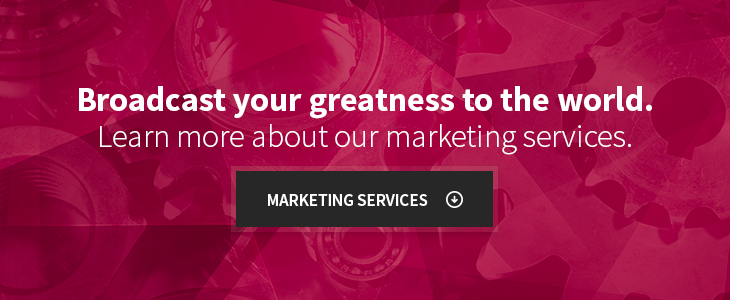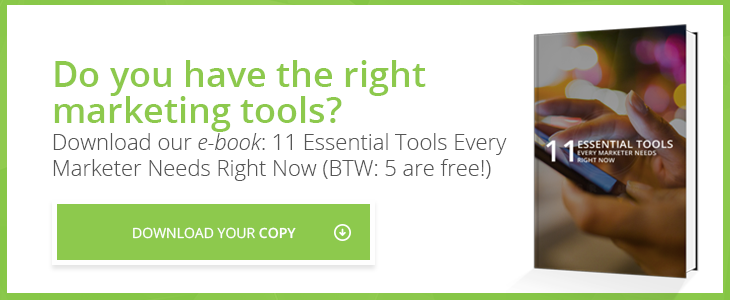It's undeniable. Thanks to the rise of marketing technology, or martech, the digital marketing landscape has changed drastically in recent years.
Whether you subscribe to traditional “push” strategies or the inbound marketing philosophy, you probably rely on some type of marketing technology provider to support your marketing efforts. It's time to look at just how it influences (and should influence) them.
Defining MarTech
Marketing technology accounts for companies who provide software and other technology that aid your marketing effort. Here's a more formal definition:
“Marketing technology are tools that make life simpler for marketers to market. They automate difficult, time-consuming and repetitive manual tasks to surface customer insight. Built by technologists, used by marketers. Marketing technology should aim to remove or significantly reduce the need for IT involvement. In short, to keep marketing in marketing.”
In other words, it can provide the backbone of your marketing efforts by giving you the tools necessary to succeed digitally even without a technical background.
MarTech Examples
To help understand the concept better, let's take a quick look at actual companies in the industry. HubSpot, Salesforce, and other marketing automation or CRM software solutions are often-cited examples of martech companies that have carved out a niche in the digital space.
By enabling their clients to not only collect contacts in a database but also segment and communicate with these contacts, these services allow marketers to focus on the strategic elements of marketing rather than the technical details.
But of course, martech providers go beyond email and CRMs. As we speak, the use of augmented technology is a hot topic in the digital marketing world, made possible by Marketing Technology.
In short, augmented reality marketing is “a digital element superimposed or added to another environment, be it print, television, or real world.” McDonalds used the technology to great effect during the 2014 FIFA World Cup, and IKEA has been doing the same with its catalog, enabling users to add virtual furniture to their rooms.
In other words, martech is everywhere and it’s relevant to nearly every industry. But before we talk about what this influence means for marketers like you, let’s address one final part of its definition: the differences from (and possible convergence with) a similar concept.
MarTech vs. Ad Tech
Martech and ad tech can seem incredibly similar. And just like many people mistake advertising and marketing for mere synonyms of each other, the same thing can easily happen with martech and ad tech. Of course, as any experienced marketer knows, marketing and advertising are not identical.
Advertising deals solely with paid promotional output about a brand and its products or services. Marketing, on the other hand, in its ideal form, offers a more wholesome approach to getting a product to its customer: marketing considerations are involved in product and consumer research, pricing strategies, and promotion.
Marketing necessarily includes advertising. At the same time, advertising is only a small part of a company's marketing activities.
Ad tech describes providers who are responsible for getting digital ads where they need to go. Google, for example, is an ad tech provider through its AdWords platform. The same can be said for Facebook, Rocket Fuel, and other providers. It comprises products that help you direct your digital promotional efforts.
Martech, on the other hand, covers a broader range, describing the entirety of technology designed to assist with your promotional efforts. In other words, ad tech is a part of martech—but martech can go far beyond mere ad tech providers.
Of course, this distinction may soon not matter much anymore. Increasingly, we are seeing a convergence of both concepts, in which providers offer comprehensive solutions that help you place digital ads while at the same time helping you manage your marketing solutions.
According to one industry expert, the reason for this convergence is a similar set of goals:
“The end state for both of them is the delivery of contextually relevant messages. Advertisers who focus on display advertising want to put up a digital ad that's relevant. They want people to act on it. They want people to convert.
The same is the case for marketing technology. It's delivered in a different manner with marketing technology. But the end state is the delivery of a personalized message, which someone then acts on—and eventually converts.”
While the distinction between martech and ad tech remains important, its conversion trend is important to keep in mind as we move to the next section:
Consequences For Marketers
Make no mistake: the rise of marketing technology, particularly CRMs and marketing automation software, has changed the digital marketing game. Above all else, it has enabled the possibility of inbound marketing even on small budgets.
Just a few years ago, small businesses without a dedicated marketing specialist would have found the concept of strategically converting and collecting leads, then nurturing them to becoming customers unrealistic and simply too time-consuming.
Today, software like HubSpot and Marketo enables these same businesses to do just that, taking advantage of the considerable ROI benefits offered to inbound-oriented marketing methods.
Marketing technology also offers a considerable benefit to help your marketing strategy succeed in the long run: consistent tracking.
By running your efforts through a centralized software system, you can follow your visitors on their way through the sales funnel, all the way to becoming customers. You can even track the success of your individual email messages and adjust as necessary.
In fact, consistent tracking is where the forecasted convergence between ad tech and martech will begin to matter. As it stands, both segments come with significant benefits but rely on their own internal metrics.
For example, you can track the success of Google ads all the way to becoming a lead. But once that important action occurs, you have no way to connect what happens to that lead back to your original ad. A world in which ad tech and martech are one and the same will mean a tracking system that you can use to analyze the entirety of your digital marketing efforts.
What The Future Holds
That this convergence will take place is now a foregone conclusion for many marketing experts, thanks to the common goals between advertising and marketing technology. But it's not the only change about to impact the industry.
For example, we expect marketing technology to assume an omnichannel presence, allowing marketers to create, change, and adjust their strategy and individual campaigns regardless of their current location. We have already begun to see this happening, as large martech providers like HubSpot now use mobile apps and a cloud-based contact database. But functionality in the current solutions is still limited, which we expect to change shortly.
It's also not difficult to envision a future in which martech takes a true omnichannel approach not only when it comes to its users, but also its audience. Even the most comprehensive solutions currently hit their limits when it comes to managing all of your digital marketing efforts, thanks in large part to restrictive APIs like Facebook and LinkedIn.
But if Instagram's recent announcement of its new Partner program is any indication, digital marketing channels everywhere are beginning to realize the value of being included in a comprehensive martech solution.
The days of having to segment our marketing efforts depending on their individual channels are long behind us. We are looking at a future in which our martech platform of choice will be the center through which we direct and adjust every aspect of our strategy, ultimately leading to a system that enables us to provide a truly consistent brand message and marketing campaign.




